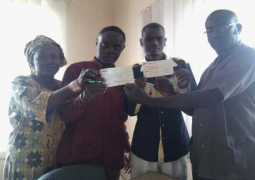Roman Catholic Bishop Of
Most of the Resurrection stories in the four Gospels tell us that the disciples of
Jesus failed to recognize him when he first appeared to them. I have often wondered why this could have happened. After all, there was a very short interval of time between the Last Supper and the various occasions when he appeared to them after his resurrection from the dead. Had he changed that much? True, it was no longer a mortal body that they saw but the glorified body of the Risen Lord. But then, did not Peter, James and John have the special privilege of getting a glimpse of the Risen Christ when they saw him transfigured on
-Master, let us build three tents.... It was just like heaven on earth. Then as they came down the mountain, Jesus told them to say nothing about what they saw 'until after the Son of Man had risen from the dead'. They had that wonderful experience, but they failed to see the message when the hour had come.
'Something prevented them from recognizing him'. This is how Luke describes the experience of the two disciples on the road to Emmaus. For them, there was something final and definitive about the death of Jesus on Good Friday. He was gone forever and there was no future for them around
- Whenever we look at people we know (or think we know), we tend to see what we expect to see. Man judges by appearances, but God sees the heart. Very often we are looking only at the cover of the book; we cannot see the treasures that are within as well as the baggage that we carry with us. The brave smile we try to put on in order to keep going can sometimes conceal a lot of pain or sorrow on the inside. Jesus knew how to help people to see more clearly. He was patient enough to allow the two disciples to share their sorrow and disappointment. Love is patient, love in kind, love is gentle.
Then he spoke to them reminding them of things he had said before a number of times: 'Was it not necessary that the Christ should suffer'?
Finally, they recognized Him in the breaking of the bread
And when he had vanished from their sight, the two disciples could say to each other: 'Were not our hearts burning within us as he spoke to us on the way'.
During Benediction of the Blessed Sacrament we sing the 'Tantum Ergo". It reminds us that 'Sight is blind before God's glory, faith alone can see His face' There is a proverb that says: 'The heart has its reasons that reason itself cannot understand'. The wisdom of such 'secular' proverbs shows us that faith and reason often go hand-in-hand.
- In
Two years after his election as Pope, the late John Paul Il-made his first pastoral visit to
The policy of the Foundation focuses especially on small project activities at village level. This helps to restore a sense of dignity to men, women and children across the country as they develop the skills and experience to provide for their basic needs.
- Like the Good Samaritan, Pope John Paul came and saw and took action. He opened a door to alleviate the sense of helplessness that has paralysed the lives of so many in this region of the world. His voice was compelling; his determination has been infectious.
While it is true that what has been achieved so far is quite limited in terms of the magnitude of the situation, it is also true to say that the dry and barren land can be changed into a fertile garden. At least some people have now seen that a better life is possible and that there is a life before death.
For God has promised that He will be with us always. This becomes possible through the faith, hope and love of all those who collaborate in this great initiative in various ways: the generous benefactors, the trustworthy administrators and the hard work of the people in the village communities.
Risen Lord, gives us eyes to see and ears to hear, so that we may no longer be prevented from recognizing your presence and your word among us, in the joys and the hopes, in the sorrows and the sufferings of your people.
'May the Light of Christ rising in glory, Dispel the darkness of our hearts and minds.
'Lumen Christi gloriose resurgentis, Dissipet tenebras cordis et mentis.'
May our celebration of Easter be a time of peace, joy and many blessings. Amen.


